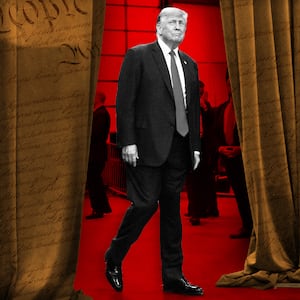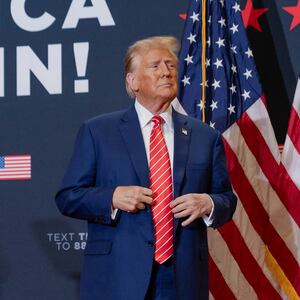Donald Trump’s lawyers argued before the D.C. Court of Appeals on Tuesday that a president’s powers are so unlimited and unchecked by the law that he could literally order SEAL Team 6 to assassinate a political rival and never face criminal prosecution so long as he wasn’t impeached by Congress.
That scenario may sound outlandish, but Trump’s lawyers happily embraced the hypothetical when challenged by appellate judges about the logical extension of their argument.
Trump is locked in a historic battle over his 2020 election interference and attempts to argue that he’s immune from prosecution over any supposed crime because he was the president at the time.
As Trump himself was in the D.C. courtroom, three federal appellate judges took turns ripping apart the ideas put forward by defense lawyer D. John Sauer, who previously clerked with the conservative Justice Antonin Scalia and later served as Missouri’s solicitor general.
The former president is trying to assert a never-before-seen level of raw power in an effort to avoid being criminally investigated and prosecuted by Department of Justice Special Counsel Jack Smith, who employed a grand jury to indict Trump with felonies last year. The question now is whether the Washington trial will start in March, as scheduled, or get tied up on appeals to dismiss the case and get it pushed deeper into the primary election season.
“Never in our nation’s history until this case has a president claimed that immunity from criminal prosecution extends beyond his time in office. The president has a unique constitutional role, but he is not above the law,” DOJ appellate lawyer James Pearce said in his opening remarks.
Trump’s attorneys went first, and it didn’t go well.
Judge Florence Y. Pan seemed shocked when the former president’s lawyer asserted that Trump could not be prosecuted for any crime committed during his time in office as long as it has the sheen of an “official act”—merely because he wasn’t impeached for it first.
In court papers, Sauer pointed to unique interpretations of Alexander Hamilton’s 1787 essays in The Federalist Papers. And in court on Tuesday, he remained firm that a political impeachment and conviction were a prerequisite to ever criminally indict a former president.
Pan reached for an outrageous example to show that argument’s folly, asking whether a president could blatantly sell pardons, shop around military secrets to foreign governments, or even task military commandos with killing an American political rival. Trump’s lawyer shocked the judicial panel by refusing to budge, justifying that impeachment is necessary first—and if it doesn’t happen, then a former president is untouchable.
“Could a president order SEAL Team Six to assassinate a political rival?” Pan asked.
“He would have to be speedily impeached,” Sauer responded. “If he were impeached and convicted first… there’s a political process that would have to occur under our Constitution.”
Later in the morning, the DOJ appellate lawyer touched on the SEAL Team Six example. “I think that is an extraordinarily frightening future,” Pearce said.
Sauer would later push back strongly on the idea that Trump was trying to remain “above the law,” calling any accusation empty and scarier sounding than it actually is.
“It’s more rhetoric than reality,” he said.
But as the hearing went on, judges seemed increasingly exasperated with the kind of limitless power this policy would afford a lawless president. Judge Karen LeCraft Henderson eventually made it clear that Trump’s legal team was warping the Constitution to serve his interests and justify the actions he took in his final days in office.
“It’s paradoxical to say that his constitutional duty to take care that the laws be faithfully executed allows him to violate criminal laws,” she said.
The topic at hand, presidential immunity, is rooted in the very foundation of the nation and requires a careful drawing of red lines by judges who must remain cognizant of their role in the American government as a whole. Judges recognize their role as a third branch of government meant to balance the power of the other two—the president’s executive branch and Congress’ legislative branch—which means they’re typically hesitant to chip away at the president’s ability to independently handle the White House.
That thinking was in play when Pan said she and her two fellow appellate judges are “supposed to conduct a balancing test.” She noted the importance of not going too far to expose a president to prosecution for conducting their official duties, making them always look over their shoulder while making pivotal executive decisions.
“I see you as trying to represent a need for the executive to have this immunity to facilitate executive functions, the ability to act without hesitation, to be fearless, to make decisions without being inhibited,” Pan said.
But then she noted that there are other “interests” as well, seeming to allude to the fact that Trump’s attempts to remain in the White House after losing the 2020 election impeded on the ability of the incoming president to do his job.
“There’s also an interest in law enforcement in enforcing criminal laws,” she said. “President Trump’s position is not fully aligned with the institutional interests of the executive branch. And in the balancing test, that weakens the executive power he’s trying to assert.”
The appellate judges also raked Trump’s team through the coals for building an entire argument that impeachment was a necessary first step—given that during Trump’s second impeachment in February 2021 for this very coup, his defense lawyers conveniently argued that political impeachment was unnecessary because criminal prosecutors could try to hold him accountable later.
“His position was that no former officer is immune. His argument was: There’s no need for impeachment because we have this backstop. And it seems like many senators relied on that… that there would be an option for criminal prosecution later,” Pan noted.
Sauer claimed to “disagree” with judges’ reading of the plain congressional record and called it “speculation” to infer what was on Republican senators’ minds when they chose to exonerate Trump.
When his turn was over, Sauer seemed to admit his side would lose this round of fighting but indicated that it’s far from over. He asked the appellate judges to hit pause on the case to allow all judges on the D.C. appellate court hear the case en banc—with an eye on an eventual appeal to the Supreme Court as well.







